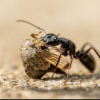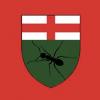The nuptial flights happened extremely late this year in the north of the Netherlands and I'm wondering how this affects hibernation.
The new queens I caught this year include Lasius Umbratus, Lasius Flavus, parasitic Formica, Lasius Fulignosa, and Lasius Niger.
Only a single one of the L. Niger has her first nanitics - she also has 4 more larvae and 2 brand new pupae.
The others all still have only larvae and/or pupae, no workers yet.
All the queens have stopped laying eggs. I'm thinking of just putting the L. Umbratus into hibernation now, because their larvae are really quite small still.
But with the Lasius Niger and Flavus, they are actively moving their larvae to the pupae stage. Does this mean I need to wait until the pupae have eclosed, then hibernate them? I'm worried that by the time all the larvae have pupated, and then the pupae have eclosed, it's going to be well past when they should have started hibernating.
I also bought a Camponotus Ligniperda queen with 6 workers earlier this year, and the 10 - 15 larvae they have are now really huge.
Should I hibernate queens now that only have larvae, before the larvae pupate? Or should I delay the hibernation until the pupae have turned into nanitics and they can have their first meal?
Thanks guys!
- Formiculture.com
- Forums
- Gallery
- Members
- Member Map
- Chat
















